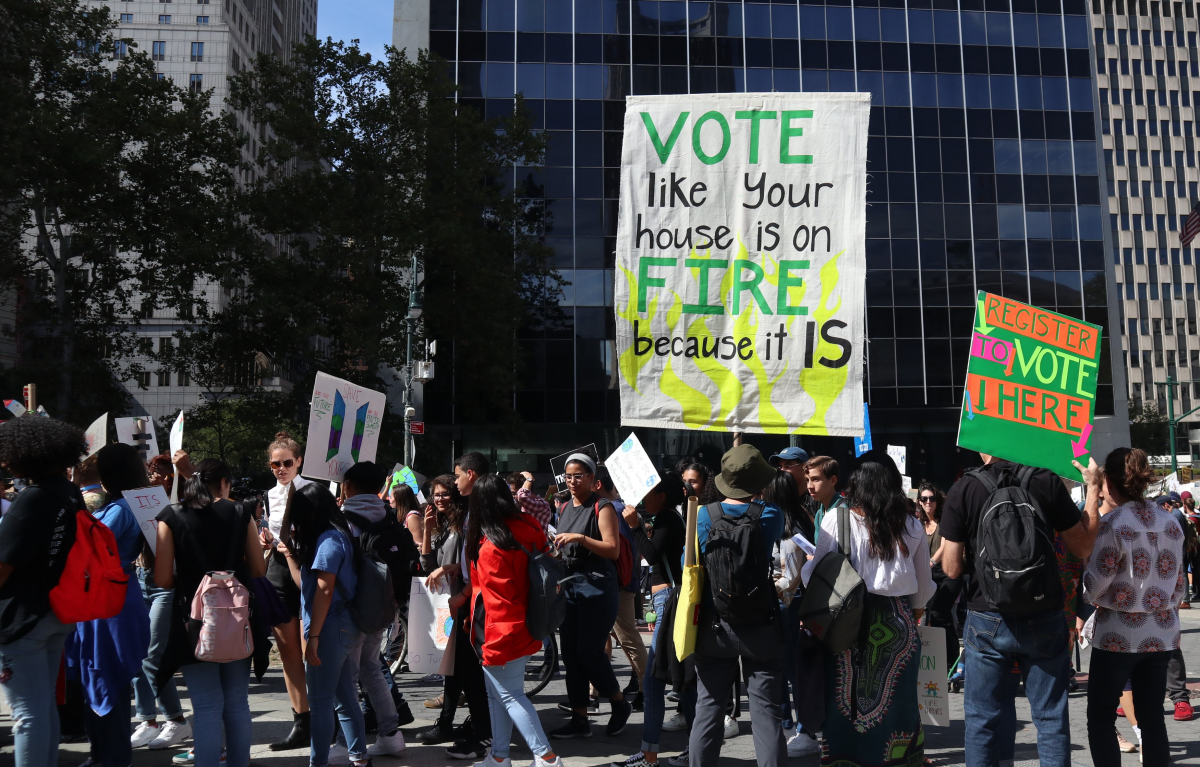Support strong Canadian climate journalism for 2025
Nearly five million Canadians have already voted in this federal election. The result still remains undecided, of course, but polling data has been providing a somewhat steady picture down the final stretch of the campaign. The most probable scenario we will awaken to next Tuesday is a hung Parliament, with the Liberals and Conservatives quite close in seat count and the balance of power residing with a few dozen NDP or Bloc Quebecois MPs and the possibility of a role for a small handful of Greens. In light of such potential outcomes, what’s a climate-first voter to do?
First, obviously, if your riding has a strong Conservative candidate, you’ll want to consider voting for whoever you deem most likely to defeat that candidate, because the non-Conservative options all come with serious climate plans and the Conservative climate plan is a tepid, reheated gas-station microwave burrito of a thing, complete with some mystery fillings no one’s even seen yet. No one should eat that junk.
But beyond that? Well, I happened to catch NDP leader Jagmeet Singh’s interview on The Current on CBC Radio this week, and one of his responses put the choice in pretty clear contrast for me. So rather than yet another across-the-board unpacking of the full details of the various climate plans (which you can find at the CBC and Policy Options), let’s zoom in on the radio sound bite.
The interview came in the midst of what have to be the best couple of weeks of Jagmeet Singh’s political career. After a year and a half as a seemingly rudderless leader of a party that was sinking in polls, donations and influence under his watch, Singh suddenly found his mojo in the three leaders’ debates and on the campaign trail. And now the NDP were soaring back to their usual spot, polling in the high teens and threatening to control enough seats to hold the balance of power in a minority government situation.
Toward the end of The Current interview, Singh was repeating his usual lines about his climate positions. “We want to align with the science,” things like that. And then came a telling exchange. “You’re opposed to the expansion of Trans Mountain,” host Laura Lynch said.
“That’s correct,” Singh replied.
“What would you do if you became prime minister?” Lynch asked.
“The first step,” Singh said, “is I would not allow for the expansion. I don’t believe in that.” Then he pivoted to his preferred platform talking point. “What we can do is make sure we use all our public dollars toward investing in clean and renewable energy.” And who could be opposed to a thing like that, right?
But instead of leaving it there, Lynch leaned back in. She asked what that would mean for Trans Mountain. Would an NDP government simply get rid of the company? And how, exactly?
Singh dissembled. The government shouldn’t have bought the project in the first place. Now they would have to assess the value of it and find some “prudent way” to divest themselves from it. In any case, Singh said, public money shouldn’t go to fossil fuel infrastructure.
And then, with time running short in the segment, Lynch moved on to another topic.
So what to make of this? From the point of view of a prominent campaign media hit, Singh did very well. He stuck to his platform, didn’t get cornered into saying anything too specific about the controversial pipeline issue, voiced his opposition firmly without sounding too cavalier about it all. And then he moved on. Because when you are the leader of the third party with no shot at becoming prime minister of Canada in a week’s time, you can skate past a huge, knotty issue like that. The next Canadian government can’t, though. And this is why Singh’s quick pivot and deke sets the country’s choice in clear relief.
On the campaign trail, Singh and the other party leaders can make all kinds of firm stances and lacquer their platforms in all manner of unalloyed virtue. Singh can claim, for example, that he would only invest in clean and renewable energy, and green-minded voters can imagine sacks of cash floating cartoon-like away from a pipeline project in Burnaby to wind turbines and solar panels across the nation. Singh doesn’t need to explain what he would say to a union representative whose welders have been put out of work or how we explain his stance to someone preparing to retire who just watched their RRSPs plummet in value.
In other words, Singh doesn’t have to answer the question in full, because there will not be an NDP government in a week.
There may, however, be a new Liberal government, and Justin Trudeau has already answered these questions. And his necessarily compromised answers make easy targets.
Trudeau’s government chose what they deemed to be the least bad option on Trans Mountain – they bought it to keep the project from collapsing and have since tried to get it built, in the hope that it would help keep the economy steady enough (and the voters on the right side of their big tent just content enough) to give them another mandate so they can keep working on their climate plan and everything else.
Their climate plan is, in my estimation, pretty close to as ambitious as a government in Canada today could hope to implement without fatally compromising their chances of re-election, which is the only way to keep enacting real climate policy when the main opposition only sneers contemptuously at the whole issue.
I also believe there’s nothing more important in this election than a national carbon price (and the rest of the Liberals’ necessarily compromised and not-yet-fast-enough climate plan) surviving one more election cycle. After that – when it fails to bring about economic ruin – it should be very hard to dislodge. I believe it was worth buying a pipeline to have a shot at making a carbon price a permanent feature of the national policy landscape. And that shot carries more weight for me than a vague, virtuous campaign-trail promise to invest only in renewable energy.
This is not an argument against voting for the NDP or anyone else in any given riding, so much as a clarification regarding the choice voters face on climate policy. The choice is not between the Liberal government’s pipeline project and no pipeline projects at all. It’s between the Liberal approach and a question mark. The question mark is understandably enticing. For the NDP and the Greens, it could mean more power than they’ve ever wielded before on the climate front. It could also mean no power – and no serious climate plan – at all.






Comments
Trudeau's insistence in ramming this pipeline down BC’s throat come hell or high water is the same kind of stupid arrogant as his insistence that SNC-Lavalin be let off scot-free. The oil-addicted province of Alberta was never going to accept any climate measures, no matter how many pipelines Trudeau delivered to them. Pipelines through Quebec? Oh no, too many votes there! The west coast livelihoods destroyed when the spill happens? F- ‘em. BC is far away from Ottawa, and there’s only a few seats there in play, and anyway, everyone will forget about our hypocrisy after a few news cycles.
Chris Turner may well believe that "there’s nothing more important in this election than a national carbon price (and the rest of the Liberals’ necessarily compromised and not-yet-fast-enough climate plan) surviving one more election cycle. After that – when it fails to bring about economic ruin – it should be very hard to dislodge." After that, when, along with all the other Liberal quarter-(if that)-measures, it fails to avert climate catastrophes from coast to coast it won't really matter who we elect, will it? One more election cycle is all we've got to enact rapid, radical cuts to greenhouse gas emissions and Mr Turner is touting a totally inadequate carbon tax as the best we can do? And, even worse, this election looks to prove him right.
Exactly....but he also seems to be trying to suggest, in a round about way, that we should abandon Singh...because his opposition to the pipeline is irrelevant, and get behind Justin, because his carbon tax will be saved on the backs of those who have to endure that pipeline. Sounds like some rather convoluted arguments from a man who once ran for the Green party in Calgary....but then.....
These are unnecessarily convoluted times.
A political view that covers-up the looming climatic imperative the world is facing. We as Canadian are members of the world society, we are all depend on the health of the world atmosphere.The atmosphere has reached a pollution level of 415 ppm in June 2019. This was done by our excessive use of GHG producing products in the last 60 years (298 ppm in 1960)
We have to turn our economy to total Clean Energy consumption immediately.
Where are the action plans of our parties nationally?
What are the action plans of our parties on the international stage?
Chris Turner sure doesn't aim very high. Jagmeet Singh said it well: It's time to align with the science. I really look forward to the possibility of a coalition or minority government representing the 2/3 of Canadians who are very concerned about climate change and want better quality responses to it by their elected representatives.
It's that question mark that has him confused I suspect. Truth is, there is no outcome in sight that can guarantee the pipeline...but there is one emerging that would seem to secure the carbon levy..thanks to the Bloc, the NDP, and the Greens. So I'm not sure what Turner is on about?
The funny thing about justifying Trudeau's purchase of a pipeline the private sector didn't much want, is that if its a carbon tax we're trying to salvage by buying the pipeline, Alberta's own NDP had a better one. It wasn't completely revenue neutral...and a larger portion of it went into a fund to pay for diversification, R and D in transitional technologies and solar rebates. Asking voters to choose between a pipeline and a question mark seems unnecessarily vague, but all things considered, I think I'll take the question mark!!!
The pipeline isn't economic, its threatening to a sister provinces land and water base, and many Canadian voters are tired of all the subsidies our tax dollars provide to oil and gas.......given that we're told services need to be cut....and a rapid transition off hydrocarbons is going to be too expensive.
I'll take the question mark, vote my vision not my fear, and continue to tell the truth to the best of my knowledge. We can't afford 50 more years of shipping raw bitumen to other people's refineries...the climate won't bear it. So Turner confuses those of us who understand the science, and I'd have to say to him:
Yes to the carbon tax; no to the pipeline. I think that is Singh's position also. Regardless of how much power you do or don't have, its a good one.
"pretty close to as ambitious as a government in Canada today could hope to implement without fatally compromising their chances of re-election," My hero, Tommy Douglas, said, "Dream no small dream". Let us not be cowed by the difficulty of the task we face. Not when the survival of our species is at stake. The electorate is capable of delivering amazing surprises. See, for example, the NDP win in Alberta in 2015. I'm one Albertan who will be voting NDP on Monday, With only a decade left to avoid catastrophe we can't afford to heed the voices of denial.